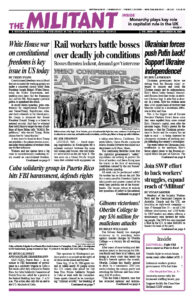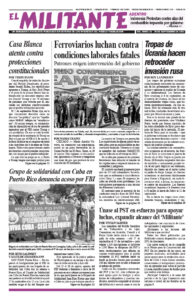ONEHUNGA, New Zealand — Wearing their firefighting gear, some 25 workers in the New Zealand Professional Firefighters Union led a protest march here Aug. 26, building support for their fight for a contract. The stoppage was part of a second one-hour protest strike by about 2,000 full-time firefighters nationwide demanding more hiring and a halt to deterioration in pay, conditions and firefighting resources.
For 13 months contract talks have been sputtering on between the union and Fire and Emergency New Zealand, a government-appointed body funded through insurance levies.
“I spend more time at work than with my family,” read one placard, underlining the overtime hours firefighters have to work to meet the rising cost of living and maintain a halfway decent service.
The full-time nationwide fire service is filled out by more than 10,000 volunteers, concentrated in rural areas, veteran firefighter John Roberts told the Militant. Though they aren’t organized in the union, “they will receive the benefits we win.”
Firefighters’ starting wage is a mere NZ$1.30 above the legal minimum wage of 21.20 New Zealand dollars ($12.90), Onehunga firefighter Chris Meredith explained. It takes two years on the job for workers to get any significant increases.
“Back in the early ’80s we had five long-ladder trucks when Auckland had 800,000 people,” firefighter Matt Akers said over a megaphone on the busy main street here. “And now we’re down to two trucks and we’re over a million people. That means that we can’t reach anyone above the third or fourth floor.”
High-ladder units can be a matter of life and death, Akers told the Militant. “If you look at what the U.K. went through with Grenfell Tower, one of the things coming out was the lack of aerial appliances to assist with rescues,” he said, referring to the deadly 2017 fire in London in which 72 people perished.
Firefighters picketing the Ellerslie fire station told the Militant of the mental and physical strain they have been placed under by Fire and Emergency New Zealand’s 2013 order making them a key part of the frontline response to medical emergencies, including suicide calls. They aren’t trained properly as paramedics to respond, they said.
On Aug. 31 the union announced it was putting further strike action on hold as negotiations had resumed under government-imposed mediation.
Felicity Coggan contributed to this article.

